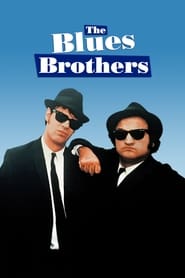This was one of those extremely eerie adult rewatches where you know absolutely everything that happens from seeing a movie countless times as a kid, yet you are also watching an entirely new film when you watch it for the first time as an adult. A brief summary of what I found surprising follows:
• Polical economy: I was surprised how much the deindustrialisation of Chicago is present: in the depicted visuals in the opening scenes; the urban sleaze under the 'L' where everybody seems to live; and even in the plot itself. Indeed, the very idea of "getting the band back together" that drives this film is strongly symbolic of returning to an earlier time in the history of Chicago; a nostalgic yearning for when men lived rewarding lives together with a sense of shared community (represented by the band) and before the loss of tens of thousands of manufacturing jobs and the subsequent decay of all public infrastructure (apart from the police). In other words, all of those things we now lump under the awkward moniker of 'neoliberalism'. All this political subtext was entirely lost on me at the time: I could barely place Chicago on a map of the US, let alone have any idea that the film was in large part a threnody to the early twentieth-century grand visions of the 'Chicago', that, say, hosted the 1893 Worlds Fair. Curiously, another film I enjoyed watching as a teenager was RoboCop (1987), which makes many parallel remarks about deindustrialised Detroit, although in an entirely different way.
• Race: I was obviously pretty blind to the race elements as a 15-year-old middle-class white Brit. These run throughout the film, not least with, say, Cab Calloway talking about the Board of Education (yes, the very same) but issues of race exist more broadly here in that, regardless of how sensitive and inclusive they might make their band, the (non-Black) Blues Brothers are appropriating a genre intensely associated with the African-American experience. It seems like Elvis is getting more of a posthumous kicking for this at the moment — I hope Eric Clapton gets it in the neck before John Belushi and Dan Ackroyd does. (Speaking of race, though, one 'goof' in the film that has not been observed by anyone else to the best of my knowledge is that the Head Nazi fails to extend his right arm in the Hitler salute whilst the Horst Wessel song is being played on his radio, thereby violating a famous 1933 Nazi law.)
• Cameos: "Ahhh, so that was Carrie Fisher? I know who she is now!" Ditto with John Lee Hooker. I still don't know who, say, Thomas "Bones" Malone really is, though.
• Law enforcement: Despite there being no jobs in this world beyond punishing service work, hawking merchandise on the street and sticking-up liquor stores to pay for huge bar tabs etc, there somehow is an infinite budget for all forms of law enforcement in this city. Plus ça change. It tickled me to learn that this seemingly unlimited budget for stunts involving police (etc.) was replicated in the production of the film itself, as wryly outlined on the film's Wikipedia page. Another thing that was completely lost on me was the conception that a police cruiser rolling up next to you might not, in fact, lead to an entirely unpleasant interaction. The Blues Brothers re-appropriation of this potent symbol of racialised and anti-Union violence was therefore somewhat amusing, although I register some mild discomfort with the joke today too.
• Class: The class angles were entirely lost on me as well. When they roll their aforementioned police cruiser through the comfortable suburbs in their hunt for the band members who have taken "straight jobs", I just thought was just another kind of neighbourhood, instead of creating a comedic juxtaposition between their vehicle, the obvious affluence of the buildings and their actual personages. (As literalised shortly after in, of course, "No ma'am, we're musicians.")
• Origins in SNL: I had no idea what Saturday Night Live even was, let alone its remarkable significance on US culture. Indeed, in production terms, this film is best described not as a 'movie' conventional understanding of that word, but rather as a 133-minute SNL sketch with a budget of about $30m.
• Musical genres: When watching The Blues Brothers for the first time at the turn of the millennium, it wasn't at all obvious that the 'blues' was, if not quite an anachronism at the beginning of the 1980s, wasn't exactly hip. After all, contemporary social and political discontent was rapidly being voiced via the fresh sounds of hip-hop and rap, and other genres such as disco had supplanted R&B as the primary music of the mainstream. Indeed, it's still difficult to imagine a time when there wasn't always a pervasive yet low-level admiration for the blues, especially after Blues Brothers helped revitalise a mainstream popular interest (and fuelling the success of artists such as Stevie Ray Vaughan; one of my personal favourites). One is therefore led to the conclusion that the success of The Blues Brothers was not only a reaction to the 'urban' culture personified by rap and hip-hop artists (and a white reaction at that…), but it was also a masculinised response to the dandified aesthetic of disco and funk as well as the potentially 'feminised' protagonists of soul.
etc. etc.
One of the many things I love about this film include the filmmakers having the confidence to throw in strange gags with seemingly no punchline (what's with the "Cheez Wiz" joke?!), as well as for all of those long shots at the beginning. Still, it loses half a point for being just a taaaad too flabby in the final act.

